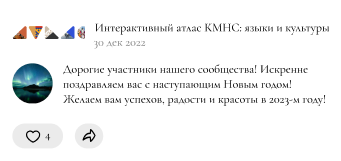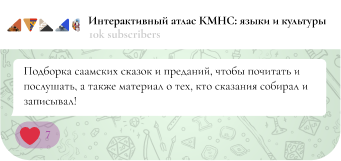The surrounding society and the main economic activity of the region of residence
Most Enets people live in the Potapovo and Vorontsovo villages. However, recently more and more residents have been leaving these areas and moving to other places of the Taimyr Peninsula, for instance, Norilsk and Dudinka.
Potapovo and Vorontsovo, which locals once considered to be the national villages of the Enets, can no longer be regarded as such, since percentage-wise, they are a minority compared with the numbers of representatives of other ethnic groups living in the same villages. Thus, in 2002, the Enets segment in the village of Potapovo was 23.8%, while in Vorontsovo it was at 12.4%. This is indicative of the general ongoing process: the Enets are increasingly forgetting their language and traditional culture and switching to the Russian language.
Most Enets families are ethnically mixed. The Enets often marry the Nenets, as well as representatives of other nationalities, including Russians, Dolgans, and Nganasans. The overwhelming majority of younger generations are people of mixed ethnic descent.
Recently, the Enets population has been growing mainly due to the restoration of the ethnic identity of the mixed Nenets-Enets population. As mentioned above, for a long time, the Russian and Soviet state administrators classified the Enets either as Nenets or Nganasans. Sometimes, the Enets were completely excluded from the list of indigenous peoples of the North from the census results. The Soviet state recognized the Enets language only in the 1960s.
In terms of their everyday routines and traditions, the Enets families do not stand out among the Nenets (both the village-dwelling and the tundra nomads). Both groups sustain themselves by doing reindeer herding and fishing. Furthermore, they share a few cultural characteristics, including their clothing and elements of folk art. Besides, it is challenging to separate the Enets from the Nenets because they often share the same (or similar-sounding) surnames. A large proportion of mixed marriages that eventually resulted in the emergence of identical clan names adds to the widely spread confusion.
The leading industry of the area where the Enets live is the extraction of crude oil and gas, whose share in the regional economy amounts to 32.6%.
In addition, the district houses fuel industry, production and distribution of energy, gas and water, food industry, and agriculture. The Enets are engaged in reindeer husbandry, fishing and hunting and other traditional types of economic activity common among the indigenous peoples of the North. The dwellers of the Karaul terrotiry (specifically the villages of Nosok and Turkhard) and Potapovo of the Dudinka urban area mostly work in reindeer husbandry.
Reindeer husbandry is carried out by those living in the territory of Karaul (the villages of Nosok, Tukhard) and Potapovo of the urban settlement of Dudinka.
Fishing is one of the main trades of the indigenous peoples of the North. They often do fishing on farms, which, regardless of their form of ownership, are primarily located in rural areas. Fishing provides the district with primary product for processing, and feeds the population.
To the south of Dudinka, a geological exploration is being carried out in the North-Vankor area, which is a continuation of the Vankor oil field. Parametric drilling is under way at the highly promising Medvezhya Ploschad. It is planned to soon begin seismic exploration at the Severo-Pyasinskaya oil and gas area, located 85 kilometers north of Bolshoi Norilsk.
In general, the resource potential is estimated at over 3 billion tons of hydrocarbons. The development of new deposits of hard coal is currently unprofitable, since the operated deposits of the Norilsk area (Kayerkanskoye, Imangdinskoye, Daldykanskoye, Listvyano-Valkovskoye and others, with the total reserves of 1.6 billion tons) satisfy the need for this type of raw material. The ore base of the municipality is represented by small deposits of copper, nickel, iron, silver, and other metals.






















































